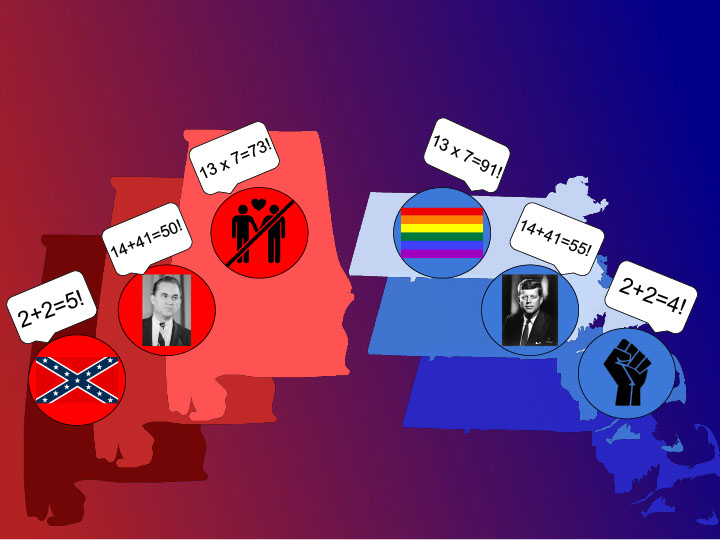Opinion: How to predict your side of history
March 28, 2021
![]() *Columns are the opinions of their respective authors and do not necessarily reflect the views of The Wichitan as an organization.*
*Columns are the opinions of their respective authors and do not necessarily reflect the views of The Wichitan as an organization.*
Imagine you’re in school again, and your answers to last night’s math homework are similar to the kid’s who always gets his answers wrong. If you’re smart, you’ll probably rethink your answers to those questions. Inversely, if your answers are similar to the Einstein of the class, you’ll probably get a good grade. But does history work the same way? Are there states who’ve answered “2+2=5” to important moral questions? Most Southern states opposed slavery’s abolition. Most Southern states opposed women’s suffrage. Most Southern states opposed the Civil Rights Act of 1964, and most Southern states opposed gay marriage. At every “bend towards justice,” old Dixie positioned itself on the wrong side. However, as I learn more about which states consistently hindered progress, I’ve also learned which states reformed society for the better. Anyone who wishes to be on the side of progress should measure their beliefs against states historically ahead of the curve. This strategy offers a good predictor of how future generations will grade our answers to the moral questions of our time.
Massachusetts was one of the first states to outlaw slavery, one of the first to ratify women’s suffrage and the first to legalize gay marriage. In addition, John F. Kennedy, who helped draft the Civil Rights Act of 1964, was a Senator from Massachusetts before being elected president. Other states have great track records, however, it’s clear that, at every bend towards justice, Massachusetts was one of the first states to lead the way. Inversely, despite other states having abysmal track records, Alabama was one of the states to lead the fights against equality. The Constitutional Convention for the Confederacy was held in Birmingham, Alabama. The state government killed other Americans in a desperate protest against abolition. The state government rejected women’s suffrage in 1919. None of Alabama’s Senators or Representatives voted for the Civil Rights Act of 1964. The former Governor of Alabama, George Wallace, proudly ran for president on a “segregation forever” platform in 1968. It’s also hard to imagine Alabama ever legalizing gay marriage without the Supreme Court’s intervention. Needless to say, Alabama is historically terrible at being on the side of justice while Massachusetts is historically successful.
This isn’t to dismiss any needed discussions on modern-day issues. We shouldn’t just cheat off the Einstein of the class to get a good grade, nor should we agree with everything Massachusetts has decided. You should still think, question and debate. Ask the same questions you would ask if your answers clashed with the student who always gets an ‘A’ in the class. If state governments, historically notorious for their oppressive stances, just so happen to agree with your conclusions to moral and legal dilemmas, you should question why your conclusions are similar to the state who always gets the answers wrong.
There are times where these two states agree on certain issues, either now or in the past. If Massachusetts had a vote on gay marriage in the 1800s, their electorate would oppose the measure, but Alabama would concur. In the same light, Alabama eventually ratified women’s suffrage in 1953, but Massachusetts was already ahead of the curve. The distinctions lie where the two states diverge. Whenever Alabama and Massachusetts disagree on an issue, Massachusetts is always ahead of its time. If someone finds themselves agreeing with Alabama’s state government and disagreeing with Massachusetts’, why should they be so confident that the dynamic, which has existed for two centuries, is now obsolete? There’s good reason to believe that the two sides of history are still at work. When engaging with our present moral dilemmas, analyzing the bellwethers of historical progress can predict how future generations will grade our answers.
I am definitely not drawing a moral equivalence between every issue. Someone who says 13 x 7 =73 is less obviously wrong than someone who says 2+2=5. Likewise, someone who is homophobic is less obviously wrong than segregationists, but they both agree with Alabama and disagree with Massachusetts. Moral and legal questions still need answering today, and these two states can indicate who’s doing their math correctly. If you’re comfortable with your grandchildren reading their history books, wondering why you didn’t support banning discrimination based on sexuality (MA: prohibits, AL: No laws), why you didn’t support banning assault weapons (MA: illegal, AL: legal), why you didn’t support raising the minimum wage (MA: $12.00, AL: No minimum), why you didn’t support the Green New Deal (MA: both senators support, AL: both senators oppose), or why you didn’t support repealing marijuana’s prohibition (MA: legal, AL: illegal), then your comfort is your own prerogative. However, if you do care to aid the waves of progress, look to the states who’ve successfully done so for centuries.


Hoostino • Jun 1, 2021 at 12:52 PM
Very well written!
Maybe you could do a future contrast/comparison of the States who are afraid of losing rights (2A, religious freedom, for example), yet have always been willing to deprive others of their rights.
You are very wise for your age!
Yours truly • Mar 30, 2021 at 4:26 PM
I really enjoyed the comparisons you used to bring light to such controversial topics. I especially liked seeing the current “political topics” compared at the end. Thanks for the artistically written article. Keep up the good work.